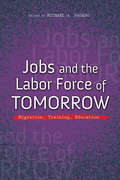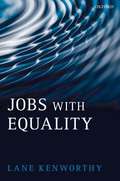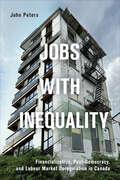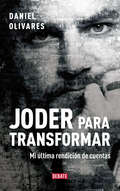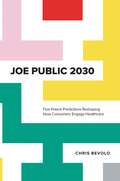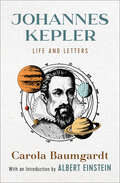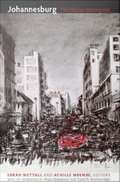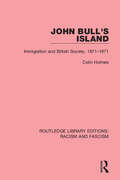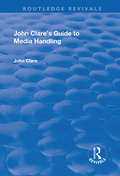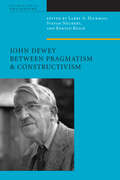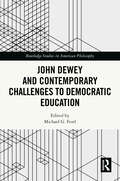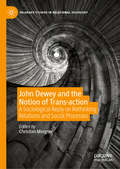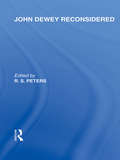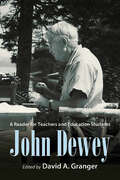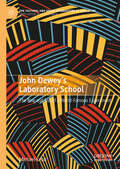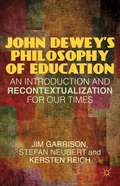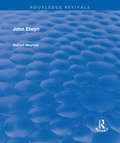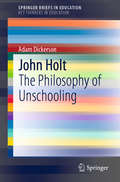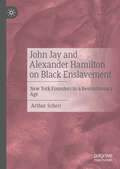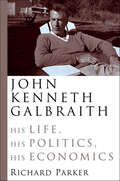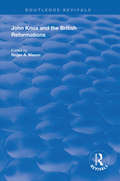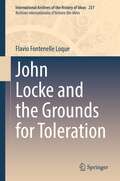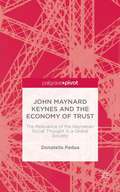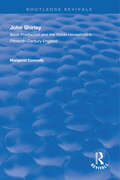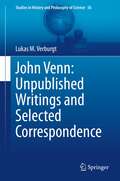- Table View
- List View
Jobs and the Labor Force of Tomorrow: Migration, Training, Education
by Michael A. PaganoThe new volume in the Urban Agenda series addresses the challenges shaping the development of human capital in metropolitan regions. The articles, products of the 2016 Urban Forum at the University of Illinois at Chicago, engage with the overarching idea that a dynamic metropolitan economy needs a diverse, trained, and available workforce that can adapt to the needs of commerce, industry, government, and the service sector. Authors explore provocative issues like the jobless recovery, migration and immigration, K-12 education preparedness, the urban-oriented gig economy, postsecondary workforce training, and the recruitment and professional development of millennials. Contributors: Xochitl Bada, John Bragelman, Laura Dresser, Rudy Faust, Beth Gutelius, Brad Harrington, Gregory V. Larnell, Twyla T. Blackmond Larnell, and Nik Theodore.
Jobs with Equality, First Edition
by Lane KenworthyThis book examines the impact on employment of six key policies and institutions: wage levels at the low end of the labor market, employment protection regulations, government benefit generosity, taxes, skills, and women-friendly policies. The analysis includes twenty countries, with a focus on Australia, Canada, Denmark, Finland, France, Germany, Italy, the Netherlands, Norway, Sweden, the United Kingdom, and the United States.
Jobs with Inequality: Financialization, Post-Democracy, and Labour Market Deregulation in Canada
by John PetersIncome inequality has skyrocketed in Canada over the past few decades. The rich have become richer, while the average household income has deteriorated and job quality has plummeted. Common explanations for these trends point to globalization, technology, or other forces largely beyond our control. But, as Jobs with Inequality shows, there is nothing inevitable about inequality. Rather, runaway inequality is the result of politics and policies - what governments have done to aid the rich and boost finance and what they have not done to uphold the interests of workers. Drawing on new tax and income data, John Peters tells the story of how inequality is unfolding in Canada today by examining post-democracy, financialization, and labour market deregulation. Timely and novel, Jobs with Inequality explains how and why business and government have rewritten the rules of the economy to the advantage of the few, and considers why progressive efforts to reverse these trends have so regularly run aground.
Joder para transformar: Mi última rendición de cuentas
by Daniel OlivaresEsta es la última rendición de cuentas de Daniel Olivares, el relato honesto de sus 16 meses como congresista. Un periodo convulso y desafiante en un sentido inimaginable debido a la inestabilidad política y la emergencia sanitaria. Joder para transformar fue su lema de campaña: el corazón de su propuesta. Estar en la calle siempre, acudir a la urgencia, presionar colectivamente, estar donde el ciudadano no puede estar, dar voz a las 80 649 personas que votaron (y a las que no votaron) por él. Esta es la última rendición de cuentas de Daniel Olivares, el relato honesto de sus 16 meses como congresista. Un periodo convulso y desafiante en un sentido inimaginable debido a la inestabilidad política y la emergencia sanitaria. Aquí Olivares revela el detrás de cámaras de su primera gestión como político en un contexto inédito. ¿Qué pasó cuando la pandemia cambió la agenda política? ¿Cómo vivió la crisis de noviembre de 2020? ¿Cómo mantuvo el equilibrio en un ambiente tan polarizado? Por último, de bonus track, responde a las preguntas inéditas de ciudadanos ante una convocatoria suya en redes sociales. Este libro es una muestra más de que la misión de Olivares es tender puentes. En un país donde el político tradicional se ha labrado a pulso su mala fama, encontramos una nueva mirada de quien ha asumido la responsabilidad de su cargo con compromiso, transparencia y amor por el Perú.
Joe Public 2030: Five Potent Predictions Reshaping How Consumers Engage Healthcare
by Chris BevoloOn the ten-year anniversary of the release of the original Joe Public Doesn&’t Care About Your Hospital book, author Chris Bevolo and Revive have set their sights a decade in the future with Joe Public 2030: Five Potent Predictions Reshaping How Consumers Engage Healthcare. The book explores five key ways consumer health engagement may change over the coming decade, covering everything from AI and personal monitoring to consumerism, new competition, the politicization of healthcare, and growing health disparities. The book makes five bold predictions about that future, which range from exciting and promising to ominous and discouraging.Based on insights developed by a team of researchers, strategists, and futurists at Revive, the five core predictions are supported by more than 250 resource citations and input from 22 industry experts who were interviewed for the book, including health system CEOs, venture capitalists, entrepreneurs, and physicians. The purpose of the book is to spark conversation about how the future of health and healthcare in the U.S. might emerge, and how individuals and organizations might want to prepare for – or even change - that future.This is Bevolo&’s seventh book, and the fourth (and final) installment in the Joe Public series. The book is scheduled for release in January 2022.
Johannes Kepler: Life and Letters
by Carola BaumgardtWith an introduction by Albert Einstein: The collected letters of the Renaissance astronomer who discovered the laws of planetary motion. Astronomer and mathematician Johannes Kepler made major contributions to the Scientific Revolution of the seventeenth century. While his achievements are well-documented elsewhere, this volume of his personal correspondence offers a rare window into the life of a man who pursued knowledge through a dangerous and turbulent period of history. Spanning more than thirty years, from 1596 to the end of his life, Kepler&’s letters reveal the internal conflicts of a devout Protestant who nevertheless opposed many pronouncements of the Church, an eminent man of science who was also swayed by astrology, and a contemporary of Galileo who served three succeeding Holy Roman Emperors.
Johannesburg: The Elusive Metropolis
by Achille Mbembe Sarah NuttallJohannesburg: The Elusive Metropolis is a pioneering effort to insert South Africa's largest city into urban theory, on its own terms. Johannesburg is Africa's premier metropolis. Yet theories of urbanization have cast it as an emblem of irresolvable crisis, the spatial embodiment of unequal economic relations and segregationist policies, and a city that responds to but does not contribute to modernity on the global scale. Complicating and contesting such characterizations, the contributors to this collection reassess classic theories of metropolitan modernity as they explore the experience of "city-ness" and urban life in post-apartheid South Africa. They portray Johannesburg as a polycentric and international city with a hybrid history that continually permeates the present. Turning its back on rigid rationalities of planning and racial separation, Johannesburg has become a place of intermingling and improvisation, a city that is fast developing its own brand of cosmopolitan culture. The volume's essays include an investigation of representation and self-stylization in the city, an ethnographic examination of friction zones and practices of social reproduction in inner-city Johannesburg, and a discussion of the economic and literary relationship between Johannesburg and Maputo, Mozambique's capital. One contributor considers how Johannesburg's cosmopolitan sociability enabled the anticolonial projects of Mohandas Ghandi and Nelson Mandela. Journalists, artists, architects, writers, and scholars bring contemporary Johannesburg to life in ten short pieces, including reflections on music and megamalls, nightlife, built spaces, and life for foreigners in the city. Contributors: Arjun Appadurai, Carol A. Breckenridge, Lindsay Bremner, David Bunn, Fred de Vries, Nsizwa Dlamini, Mark Gevisser, Stefan Helgesson, Julia Hornberger, Jonathan Hyslop, Grace Khunou, Frdric Le Marcis, Xavier Livermon, John Matshikiza, Achille Mbembe, Robert Muponde, Sarah Nuttall, Tom Odhiambo, Achal Prabhala, AbdouMaliq Simone
John Bull's Island: Immigration and British Society, 1871-1971 (Routledge Library Editions: Racism and Fascism)
by Colin HolmesThere is a strong but unreliable view that immigration is a marginal and recent phenomenon. In fact, immigrants and refugees have come to Britain throughout its recorded history. In this book, first published in 1988, Colin Holmes looks at this period in depth and asks: who were the newcomers and why were they coming? What were the distinctive features of their economic and social lives in Britain? How did British society respond to their presence? The resulting book is a major historical survey of immigration which synthesises and evaluates existing work and weaves in new material on a wide range of immigrant minorities.
John Clare's Guide to Media Handling (Routledge Revivals Ser.)
by John ClareThis title was first published in 2003. The media is an important influence on how a company or organization is perceived. This is an insider's guide to media handling, showing readers what needs to be done to achieve media success and offering them the tools to do it. John Clare is a former ITN and "Daily Mail" journalist who is now a media and crisis consultant, and here he shares his experience. He offers an in-depth examination of the different media sectors - TV, radio and print - and how to make your stories relevant to them. There is a detailed explanation of how a newsroom works, based on different desks and deadlines and how to take advantage of these. The different types of editorial pieces - news and features - are analyzed, along with the circumstances in which you should target each. The book includes coverage of the use of the Internet as a vehicle for news.
John Dewey Between Pragmatism and Constructivism (American Philosophy)
by Larry A. HickmanMany contemporary constructivists are particularly attuned to Dewey's penetrating criticism of traditional epistemology, which offers rich alternatives for understanding processes of learning and education, knowledge and truth, and experience and culture. This book, the result of cooperation between the Center for Dewey Studies at Southern Illinois University Carbondale, and the Dewey Center at the University of Cologne, provides an excellent example of the international character of pragmatist studies against the backdrop of constructivist concerns. As a part of their exploration of the many points of contact between classical pragmatism and contemporary constructivism, its contributors turn their attention to theories of interaction and transaction, communication and culture, learning and education, community and democracy, theory and practice, and inquiry and methods.Part One is a basic survey of Dewey's pragmatism and its implications for contemporary constructivism. Part Two examines the implications of the connections between Deweyan pragmatism and contemporary constructivism. Part Three presents a lively exchange among the contributors, as they challenge one another and defend their positions and perspectives. As they seek common ground, they articulate concepts such as power, truth, relativism, inquiry, and democracy from pragmatist and interactive constructivist vantage points in ways that are designed to render the preceding essays even more accessible. This concluding discussion demonstrates both the enduring relevance of classical pragmatism and the challenge of its reconstruction from the perspective of the Cologne program of interactive constructivism.
John Dewey and Contemporary Challenges to Democratic Education (Routledge Studies in American Philosophy)
by Michael G. FestlThis book reconsiders pragmatist conceptions of democratic education, especially those of John Dewey. It addresses what democratic education can mean in the face of current threats that are undermining democracy.Since the mid-twentieth century, liberal philosophers have been skeptical of fostering values through public education. Since liberal democracy must embrace different worldviews, education, especially public education, must refrain from teaching values as much as possible. Given the recent undermining of democratic nation-states and their liberal foundations, this educational abstinence can be interpreted as one of the drivers of the current crisis of democracy. This book sketches how a renewed democratic education, modeled after John Dewey and other forms of pragmatist educational philosophy, might look today. It identifies the conceptual, political, and technological challenges to education and democracy and explores how a new democratic education could be implemented in the classroom.John Dewey and Contemporary Challenges to Democratic Education will appeal to scholars and advanced students interested in pragmatism and American philosophy, the philosophy of education, and political philosophy.
John Dewey and the Notion of Trans-action: A Sociological Reply on Rethinking Relations and Social Processes (Palgrave Studies in Relational Sociology)
by Christian MorgnerEngaging with several emerging and interconnected approaches in the social sciences, including pragmatism, system theory, processual thinking and relational thinking, this book leverages John Dewey and Arthur Bentley’s often misunderstood concept of trans-action to revisit and redefine our perceptions of social relations and social life. The contributors gathered here use trans-action in a more specific sense, showing why and how social scientists and philosophers might use the concept to better understand our social life and social problems. As the first collective sociological attempt to apply the concept of trans-action to contemporary social issues, this volume is a key reference for the growing audience of relational and processual thinkers in the social sciences and beyond.
John Dewey reconsidered (International Library of the Philosophy of Education Volume 19)
by R. S. PetersJohn Dewey was one of the most influential American philosophers of his time and also one of the most prolific, with about forty books and 700 articles to his credit. When this book was originally published in 1977 Dewey's work, with the exception of his important contributions to the philosophy of education, had suffered an unwarranted scholarly neglect and remained little known outside the USA. This present volume helped redress this balance.
John Dewey: A Reader for Teachers and Education Students
by David A. GrangerDesigned specifically for teachers and education students, with carefully selected articles, lectures, and book chapters covering Dewey's major ideas.This John Dewey reader was designed specifically for teachers, teacher educators, and education students. Using carefully selected articles, lectures, book chapters, and other brief writings from Dewey's collected works, it covers major concepts and ideas from his extensive research and reflections on education and teaching. The twenty-five readings were carefully chosen for their accessibility and their continuing relevance to the work of classroom teachers and other school-based practitioners. To enhance its usefulness, the book contains a glossary of Deweyan terms, summaries for each reading, a selective annotated bibliography, and an index. Instead of merely encountering Dewey's views secondhand, this volume empowers readers to access and explore primary sources in a user-friendly way.
John Dewey’s Laboratory School: The Rise and Fall of a World-Famous Experiment (The Cultural and Social Foundations of Education)
by Michael KnollThe Laboratory School is presumably the most famous experimental school of the progressive education movement. Founded in 1894 by John Dewey and President William R. Harper, the Laboratory School existed at the University of Chicago for seven and a half years, and even after more than a century, remains a beacon of hope and inspiration for many educators. The present volume ventures to provide the first institutional history of the Laboratory School and to situate the school in its contemporary context. Drawing on new archival and historical materials, the book tells the story of a legendary school experiment that experienced a steep rise and a dramatic fall due to unsuitable structures and unfortunate decisions.
John Dewey’s Philosophy of Education
by Jim Garrison Kersten Reich Stefan NeubertJohn Dewey is considered not only as one of the founders of pragmatism, but also as an educational classic whose approaches to education and learning still exercise great influence on current discourses and practices internationally. In this book, the authors first provide an introduction to Dewey's educational theories that is founded on a broad and comprehensive reading of his philosophy as a whole. They discuss Dewey's path-breaking contributions by focusing on three important paradigm shifts - namely, the cultural, constructive, and communicative turns in twentieth-century educational thinking. Secondly, the authors recontexualize Dewey for a new generation who has come of age in a very different world than that in which Dewey lived and wrote by connecting his philosophy with six recent and influential discourses (Bauman, Foucault, Bourdieu, Derrida, Levinas, Rorty). These serve as models for other recontexualizations that readers might wish to carry out for themselves.
John Elwyn (Routledge Revivals)
by Robert MayrickThis title was first published in 2000: The author examines the work and career of an artist whose idealized and peaceful vision of the Welsh countryside reflects the quieter strain of Neo-Romanticism in British landscape painting. The volume includes plates and lists exhibitions and public collections.
John Holt: The Philosophy of Unschooling (SpringerBriefs in Education)
by Adam DickersonThis is the first-ever book to offer an analytical study of John Holt’s philosophy of education. It provides a clear analysis and critical evaluation of the key themes in his work, considers the main objections to his views, and discusses their relation to the contemporary homeschooling movement. The book examines Holt’s critique of compulsory education and his account of the relationships between learning, freedom, intelligence and character. It argues that Holt’s works contain a philosophically rich critique of instrumentalism in education, and thus continue to represent a significant challenge to many mainstream views on education today. Given its scope, the book will be of interest to anyone who wants to understand Holt’s work and influence as a critic of compulsory schooling; educators and education students; philosophers of education; and those seeking a better grasp of the ideas behind unschooling and homeschooling.
John Jay and Alexander Hamilton on Black Enslavement: New York Founders in a Revolutionary Age
by Arthur ScherrIn this groundbreaking study, Arthur Scherr examines the positions on slavery held by two of the most famous New Yorkers of the early American Republic: John Jay and Alexander Hamilton. Using Hamilton's 1779 proposal to free Southern slaves on the condition that they fight in the Continental Army as a starting point, Scherr assesses the pair’s positions on enslavement. Utilizing often-untouched resources, Scherr offers a re-evaluation of Hamilton and Jay’s modern status as antislavery icons.
John Kenneth Galbraith: His Life, His Politics, His Economics
by Richard ParkerThe life and times of America's celebrated economist, assessing his lessons-and warnings-for us today.John Kenneth Galbraith's books—among them The Affluent Society and American Capitalism—are famous for good reason. Written by a scholar renowned for energetic political engagement and irrepressible wit, they are models of provocative good sense that warn prophetically of the dangers of deregulated markets, war in Asia, corporate greed, and stock-market bubbles. Galbraith's work has also deeply-and controversially-influenced his own profession, and in Richard Parker's hands his biography becomes a vital reinterpretation of American economics and public policy.Born and raised on a small Canadian farm, Galbraith began teaching at Harvard during the Depression. He was FDR's "price czar" during the war and then a senior editor of Fortune before returning to Harvard and to fame as a bestselling writer. Parker shows how, from his early championing of Keynes to his acerbic analysis of America's "private wealth and public squalor," Galbraith regularly challenged prevailing theories and policies. And his account of Galbraith's remarkable friendship with John F. Kennedy, whom he served as a close advisor while ambassador to India, is especially relevant for its analysis of the intense, dynamic debates that economists and politicians can have over how America should manage its wealth and power. This masterful chronicle gives color, depth, and meaning to the record of an extraordinary life.
John Knox and the British Reformations (Routledge Revivals)
by Roger A. MasonPublished in 1998. John Knox is one of the towering figures of the European reformation, his name synonymous with hard-line evangelical Protestantism, and his influence spreading far beyond his native Scotland. Yet no scholarly biography of Knox has appeared for over 20 years, and no attempt has been made to re-evaluate his contribution to the reformation in the light of the massive advances in scholarship made in recent years. This volume, therefore, seeks to reassess Knox's career in the context of the European Reformation as a whole, but with particular reference to his impact in Scotland and England. The 13 contributors, all acknowledged authorities in the field, together provide a significant reappraisal of Knox and his role in the British Reformations.
John Locke and the Grounds for Toleration (International Archives of the History of Ideas Archives internationales d'histoire des idées #237)
by Flavio Fontenelle LoqueThis book offers a detailed analysis of John Locke’s case for toleration and proposes an interpretation that shows the links between his political reasoning and his reflection on the ethics of belief. Locke is concerned with toleration not only when he discusses the ends of the Commonwealth, but also when he assesses the duties of private persons regarding the search for truth. The purpose of this book is to shed light on both of these branches, which have not been sufficiently explored in other studies on Locke. With particular attention to the notions of charity, obstinacy, fallibility, reciprocity and distinction between belief and knowledge, the author proposes a reading of the Epistola de Tolerantia, an extensive discussion of the controversy between Locke and Jonas Proast, as well as an examination of An Essay Concerning Human Understanding, in order to establish the meaning and interconnection of Locke’s arguments in favour of toleration.
John Maynard Keynes and the Economy of Trust: The Relevance of the Keynesian Social Thought in a Global Society
by Donatella PaduaPadua has asked the question: How is it possible to build value via trust? She has answered through the construction of a compelling argument for the creation of a balanced global economy and a fairer distribution of wealth based upon that elusive quality of trust. - Garry Titterton, Tonjin University, Shanghai, Co-author Brand Storming.
John Shirley: Book Production in the Noble Household in Fifteenth-century England (Routledge Revivals)
by Margaret ConnollyPublished in 1998. John Shirley’s importance as a scribe of late fourteen-and early fifteenth-century vernacular poetry (in particular the works of Chaucer and Lydgate) has long been recognised. Not only did Shirley bring these works to the attention of a wider audience in his own time, but the survival of some if his manuscripts has perpetuated these texts for future generations of readers. Indeed, some of these poems are now only known through his manuscripts. <p><p>In this meticulously researched survey, Margaret Connolly makes a thorough examination of all extent documents relating to Shirley’s life and carefully scrutinises the physical characteristics of his manuscripts. In so doing she dispels many of the false interpretations that have arisen from speculation about the nature of Shirley’s scribal activities. The book concludes that there is no evidence to suggest that Shirley acted as a bookseller, but plenty to indicate that he lent his books extensively. <p><p>This book’s survey of volumes owned or used by Shirley provides general insights into the availability and circulation of literary texts in the fifteenth century. Palaeographers and those with a general interest in the history of the book will find this studying fascinating.
John Venn: Unpublished Writings and Selected Correspondence (Studies in History and Philosophy of Science #56)
by Lukas M. VerburgtThis is the first book to present a carefully chosen and annotated selection of the unpublished writings and correspondence of the English logician John Venn (1834-1923). Today remembered mainly as the inventor of the famous diagram that bears his name, Venn was an important figure of nineteenth-century Cambridge, where he worked alongside leading thinkers, such as Henry Sidgwick and Alfred Marshall, on the development of the Moral Sciences Tripos. Venn published three influential textbooks on logic, contributed some dozen articles to the then newly-established journal Mind, of which he became co-editor in 1892, and counted F.W. Maitland, William Cunningham and Arthur Balfour among his pupils. After his active career as a logician, which ended around the turn of the 20th century, Venn reinvented himself as a biographer of his University, College and family. Together with his son, he worked on the massive Alumni Cantabrigienses, which is still used today as a standard reference source. The material presented here, including the 100-page Annals: Autobiographical Sketch, provides much new information on Venn's philosophical development and Cambridge in the 1850s-60s. It also brings to light Venn's relation with famous colleagues and friends, such as Leslie Stephen, Francis Galton, and William Stanley Jevons, thereby placing him at the heart of Victorian intellectual life.
